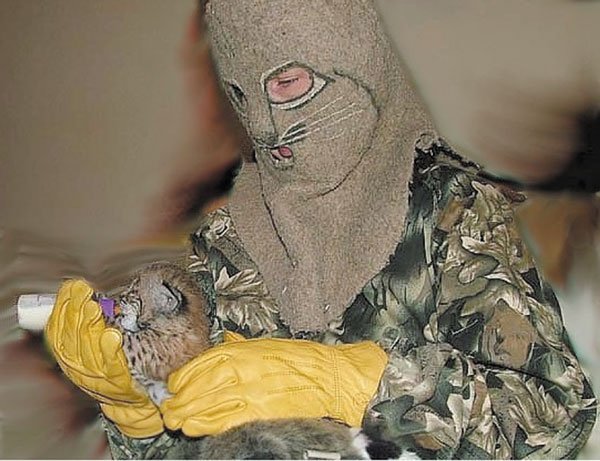In September 2004, a mother bobcat was found lying in a field,
dead from a gunshot wound. Next to her were her two tiny kittens,
one already dead of starvation and exposure. The other kitten,
which weighed only three-quarters of a pound, was more fortunate
and was brought to the Wildlife Education
&
amp; Rehabilitation Center in Morgan Hill.
In September 2004, a mother bobcat was found lying in a field, dead from a gunshot wound. Next to her were her two tiny kittens, one already dead of starvation and exposure. The other kitten, which weighed only three-quarters of a pound, was more fortunate and was brought to the Wildlife Education & Rehabilitation Center in Morgan Hill. The 3-week-old male kitten was given a thorough veterinary exam and proclaimed hungry but in good health. From the very beginning, volunteer caretakers always wore a full-body costume, mask and gloves, all scented with herbs and bobcat urine in order to cover up their human scent and to ensure that the bobcat did not become habituated to humans. The surrogates remained completely silent and “walked” on hands and knees only. The kitten was named “Newman,” after the area where he was found. He was bottle-fed and lived in a special indoor habitat featuring a mirror so that he could see what a real bobcat looked like.
After a month, Newman was weaned and was big and feisty enough to transfer to a large outdoor enclosure at W.E.R.C. The surrogate mothers continued to act as his mom, feeding him mice and spending much time playing with him. Chasing a toy mouse on a string and pouncing on twigs were favorite games which helped him develop his hunting skills, as well as providing him exercise. Newman now weighs more than 13 pounds, no longer needs his “mom” and has proved himself a capable hunter of rodents, which will be his main food source when he is released this spring.
W.E.R.C. rehabilitates orphaned, injured and sick native wildlife so that they can be released back into their habitat. W.E.R.C. is the only facility in South Santa Clara County licensed by the California Department of Fish and Game and by the U.S. Fish and Wildlife Service to provide rehabilitative services. You may contact W.E.R.C. by calling (408) 779-9372 or visiting www.werc-ca.org.














